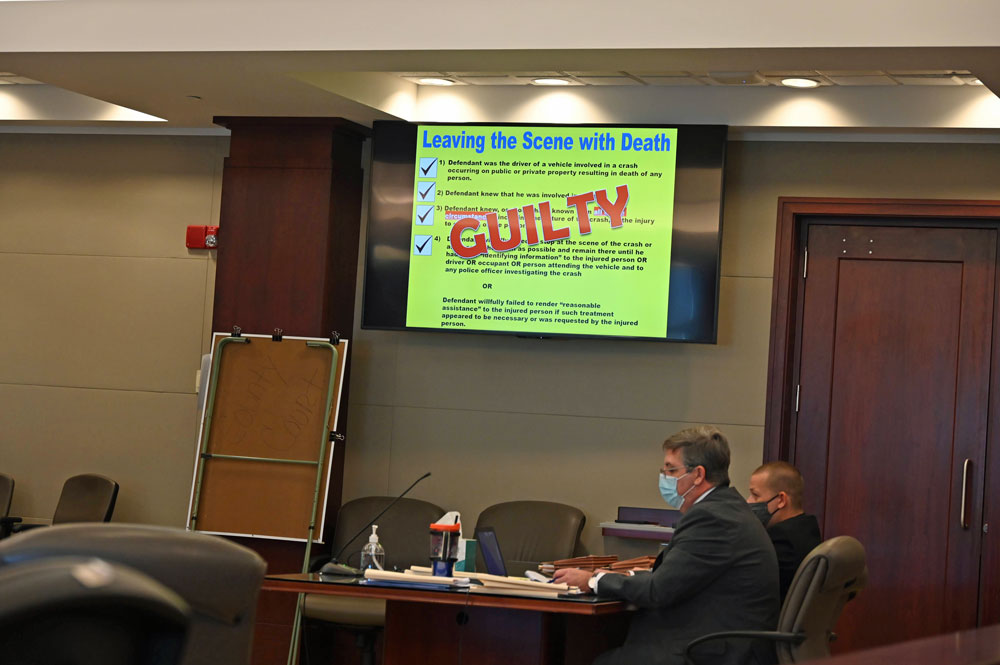
“I’ll tell you what, if you hit something, and a human being is on your hood, you’re going to sure know that,” Jason Lewis, the prosecutor, told the jury this afternoon. “And if you don’t know that, you reasonably should have known that.”
Joshua Carver, 36, claimed not to have known that. He knew he’d struck something as he was driving his work van on State Road 100 the afternoon of Feb. 27, 2020. “When it hit it had weight to it, it hit, it jolted me,” he told a cop at the time. But he told the officer he thought it was an object that had fallen from the flatbed truck in front of him. So he kept going–despite the gash the collision caused on the right side of his van, smashing out the headlight, crushing the hood and splattering the side of the white van with blood.
He had not struck an object, and none of the sort of objects he described–none of the objects he claimed to have struck–were found at the scene.
He’d struck Jonathan Rogers, a 29-year-old man who had been walking along State Road 100 with his maroon backpack. He’d struck him at 57 miles per hour, catapulting him in the air and dozens of feet toward the woodline–a collision a Palm Coast man a few car lengths just past saw unfolding in his rear-view mirror. That man stopped, turned around, his mother–who was in the passenger seat–called 911, and he ran to Carver, who was already dead.
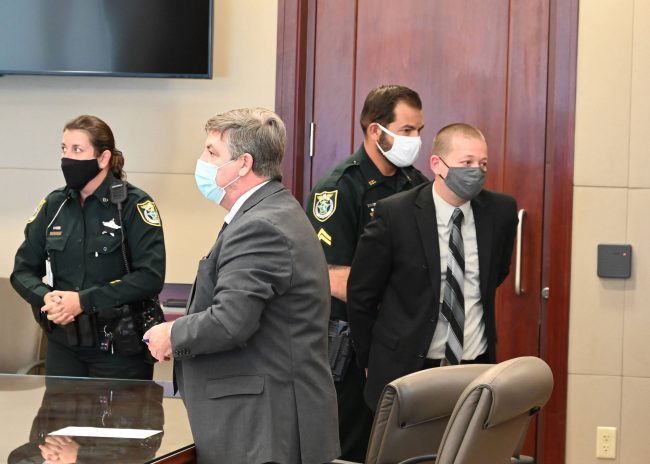
A jury took barely 30 minutes this afternoon to find Carver guilty of leaving the scene of the crash with a death, a first-degree felony that exposes him to a maximum of 30 years in prison, and a minimum mandatory four years in prison, given his until-now spotless criminal record. Two days ago, just before jury selection, Carver had turned down an offer from the state: two to three years in prison, seven years on probation. Carver wanted his trial. The rejection of the deal will not play in his favor at sentencing time, but anything close to a 30-year term, or even a term that nears double digits, is very unlikely: he may have been callous and panicked. He was not malicious or cruel. But prisons are filled with dupes of misjudgments.
When Assistant Public Defender Bill Bookhammer made his opening arguments to the jury on Tuesday, he said the jury would end up hearing from Carver, raising the possibility that Carver would take the stand. He did not. The defense offered no witnesses. After the lunch recess today, both state and defense rested. Bookhammer had had a brief conference with Carver about whether he would testify. Bookhammer looked put out, only telling Circuit Judge Chris France that Carver was not going to testify. The jury didn’t see the exchange. It was waiting to be called back in. France, for the record, asked Carver directly what his intentions were. Carver said he was not testifying.
Carver had seen a day and a half of Assistant State Attorney Jason Lewis in action. Maybe he’d wanted to testify and changed his mind. Lewis is a paragon of courtesy and friendliness when court isn’t in session. He is an unforgiving cutthroat when it is in session, and ridiculously, terrifyingly self-assured, quickly demoralizing hostile witnesses. He is as skilled at demolishing almost any defense–especially when there isn’t much of a defense–as he is at anticipating every step the defense might attempt, and demolishing that, too, as he did today with bewildering foresight.
In the closing arguments of a criminal trial, the prosecution goes first, followed by the defense. But the prosecution gets to go again and have the last word. Ordinary prosecutors might throw most of their evidence in their first go, reserving more rhetorical comebacks for their second closing. Lewis, in a reflection of supreme confidence, held back a clincher for that second closing, assuming (correctly) that Bookhammer would fall in his trap.
Bookhammer’s defense was that for Carver, it was all “a normal day of work for him, he’s just going home,” and that “there’s no evidence that he’s some monster.” He painted his client as the single father of a young child, a deliveryman back from his routine run, due to pick up his young son from daycare in 90 minutes. He had no idea he had hit a human being. He claimed to police that he “immediately” called his boss, and that his boss told him the vehicle would be towed and a police report filed later on.
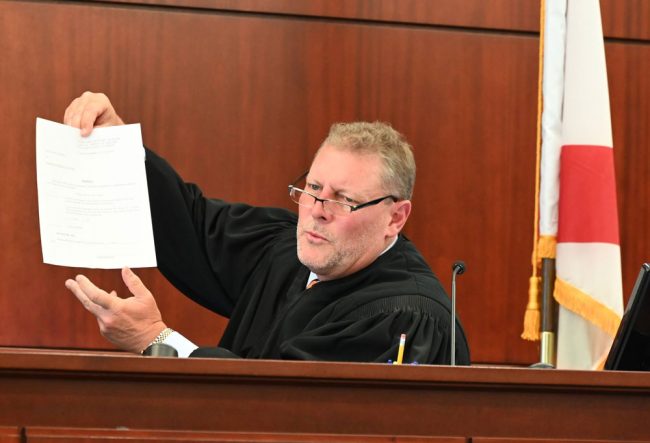
If the original claim that he had no idea he’d hit a person was true, the rest was a lie that made the original claim difficult to believe. Lewis showed the jury the time stamps of Carver’s phone calls. His first call to his boss was almost seven minutes after the crash. Seven minutes that, as Lewis argued, gave Carver ample time to come up with a bogus story about fencing or a chair or concrete posts falling off the truck ahead of him and striking his van. Carver, Lewis told the jury, knew that he had been in a grave collision, knew that he should have stopped, and knew that he should have called authorities, as the law requires. “He doesn’t get to bury his eyes in the sand and pretend that he didn’t know, and try and get away with it,” Lewis said. “I submit to you in this case, this defendant had that vantage point. He knew it, he saw Mr. Rogers, he got distracted, and he hit him. He panicked, and he took off. How he got distracted? I don’t know. That’s really not one of the elements in this case, ladies and gentlemen.”
Carver also told his boss that his windshield had cracked, and that he had tried to catch up with the flatbed ahead of him that caused the alleged collision, but the flatbed was going too fast. That, too, was a lie: a surveillance video from a school bus driving in the opposite direction would discredit Carver’s claim.
“That looks like someone who’s coming up with their story about what happened to cover it up,” Lewis told the jury. “It’s clear as day ladies and gentlemen that this defendant had panicked, he took off, and he came up with this story on the run.”
He drove on for 14 miles. He pulled off the road only because his van was overheating. Only then he surveyed the full damage to the van–and still did not call authorities. He called his boss again and requested a tow truck. Lewis argued that even if Carver’s original claim of not realizing he’d hit a person was true, the gravity of the crash was obvious to him when he stopped, and he should have called authorities then. He still didn’t. (Bookhammer in his closing made the unassailable point that a guilty verdict would not bring back Rogers, an attempt to appeal to the jury’s sympathy for a young father caring for his son. But the hit-and-run law is designed to deter the sort of callousness or indifference that would allow someone to drive away from any crash scene where the responsibility of alerting authorities and rendering help could, in many circumstances, prevent the worst. By choosing to drive away from the scene or not alerting authorities even after discovering the seriousness of the crime, Carver was defying the moral code behind that law.)
By then the Flagler County Sheriff’s office, thanks to the eyewitness’ call to 911, had disseminated a be-on-the-lookout alert to surrounding law enforcement. A Putnam County Sheriff’s deputy saw the white van on the side of the road, matched it with the alert, and identified Carver. He would soon detain him, and later that evening, the Florida Highway patrol placed him under arrest.
Bookhammer’s defense centered especially on a rusty chair that was found at the scene of the collision. Bookhammer argued that that was the object that had fallen from the truck, that had caused Carver to swerve one way, then another, and that had collided with the van. He even showed a picture that showed rusty scuff marks on the van;’s front bumper. Bookhammer also offered several other defenses. But Lewis discredited claim after claim: the chair. The sun in Carver’s eyes. The concrete poles that might have fallen off the truck (that fencing company never carried concrete poles). The chain-link fencing that might have fallen off. There were no concrete poles at the scene. No concrete poles.
Just that rusty skeleton of a chair.
“Maybe it’s not about choices, maybe it’s about a chair,” Lewis told the jury, closing in on his opening argument’s theme: that it was about Carver’s bad choices to run from the scene. “But I submit to you, this chair has nothing to do with this crash.” Lewis also discredited Carver’s own reconstruction of the crash, including his claim that he veered to the left before veering to the right and striking Rogers, even though the witness never saw that double swerve–just the strike against Rogers.
Bookhammer, as humane a lawyer as there is, tried to humanize his client, though there was precious little information about his (or even Roger’s) characteristics from either side. Bookhammer relied on ordinary indices that apply to the overwhelming majority of people: Carver at the time of the collision wasn’t on the phone. He had a valid driver’s license. He wasn’t speeding. Nice to know, but nothing so distinctive as to overcome the prosecution’s point: that Carver’s very ordinariness, the moment it lurched in unordinary territory, panicked and took a wrong turn.
“The state’s argument is that Mr. Carver is a clever enough, callous individual that would make up a story,” Bookhammer said, “and then be naive enough to waive his rights not to talk to the police, and give them a statement, and not only talk to them, but to tell his boss that he had been in an accident, to tell the police that he had been in an accident, tell two police officers he had been in an accident, to tell the first officer at the scene he had been in an accident.”
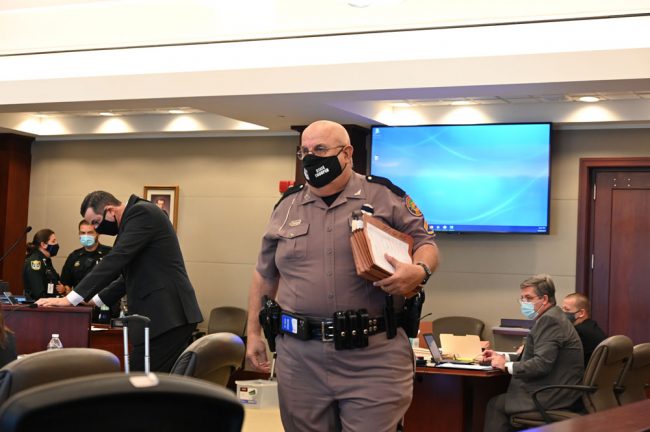
When lawyers resort to tautological arguments–saying the same thing by different means–you know they’re reaching: they’re short of substance, so they resort to rhetoric, attempting persuasion by identical hammer blows, hoping the jury won’t notice. But most juries do, and this diverse jury of middle-to-past-middle-age residents did not have credulity for wrinkles.
Carver spent the majority of the day as he did the first day–hands clasped in front of him, on top of the table, his head just barely bowed, his eyes often closed as if he were in prayer, or in thought, or attempting to put himself somewhere else, or craving a cigarette (he smoked during breaks). The prosecution had alluded to his smoking in its closing arguments: he may have been reaching for a cigarette or a lighter and briefly lost focus on the road. But that was speculation based on the cigarettes found in his truck.
Two of his family members sat behind him in the courtroom. He did not react when the guilty verdict was read. He just turned to his family members, and turned back to face the front. Unlike in Judge Terence Perkins’s courtroom–where one bailiff in particular likes to slap on the handcuffs the second the word “guilty” is heard–the bailiffs on duty in France’s courtroom were more considerate. They stood by, giving Carver room. The state asked that he be remanded to their custody, his bond revoked. The defense argued that he would need time to get his affairs in order, take care of his 6-year-old son, and that, as he had for the year and a half since the original charge, he was not a flight risk. It would be weeks before sentencing, a date that wasn’t set yet.
France isn’t known for magnanimity. Few judges in the Seventh Judicial Circuit are. He ordered Carver’s bond revoked and his jailing immediate. The days in jail will count as credit against his prison term, but that was small consolation to him or his family members. They exchanged a few words, but after the judge’s order, the cuffs were on, and Carver was walked out the side door even before the usual fingerprinting required by the Florida Department of Corrections (the state’s preferred euphemism for its vast prison system).
Rogers’s mother was in the courtroom, along with one other family member who spoke in humble terms when asked about Rogers. Rogers’s mother had driven down from Virginia to attend the proceedings. She was relieved, almost celebratory, as she was readying to drive out.
But those familiar with the process know better than to confuse justice with triumph. Lewis himself cautioned Rogers’s mother against an effusive reaction when the verdict was read, and she respected his caution.
The very first image Lewis flashed on the overhead screens in the courtroom was that of Jonathan Rogers, a young, smiling man with a past that remained entirely mysterious throughout the trial, though he’d had his own troubles with the law in his youth. Little else would be known about him but that portrait, a heartbreaking contrast with the shattering image–flashed too many times during the trial, for prosecutorial effect–of Rogers lying dead by the roadside, shoeless (one of his shoes would not be found until days later: it had been stuck to Carver’s van for almost two miles before dropping off) and his shirt crumpled up just enough to reveal his midsection, just enough for a final indignity in a life’s brutal, gratuitous end.
“He walked with a gentle hand,” his other family member said just before the verdict, before issuing the sort of verdict that seemed to apply to everyone in the courtroom: “It’s a sad day.”
![]()
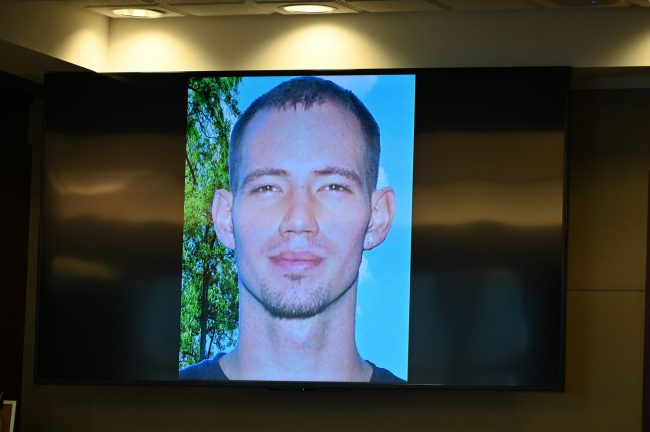





























Brad says
Someone’s life is worth more than 30 years, should be life without any chance of parole.
Trailer Bob says
What a mess. You never know what the day will bring to your life, or end of life in one case.
Just a horrible incident for both sides. Very sad.
Skibum says
While reading this article describing the trial, I was very glad to hear that Assistant State Attorney Jason Lewis is a very thorough and relentless prosecutor. It sounds like he has dedicated his professional life to seeking justice for crime victims, and is extremely proficient at his job. I hope this case and others like it become a wake-up call to those who might consider fleeing after having been in a serious collision. Mistakes happen, and had Carver just stopped immediately and reported the accident, he would not be sitting in a jail cell today facing the possibility of many years in prison. I hope Carver’s felony conviction brings some sort of peace to the victim’s family.
Teresa says
Relief has been received and I’m so very thankful for my son to have had Jason Lewis to represent him. Mr. Lewis was amazing! The two witnesses were my son’s angels for coming forth as they did.
However a part of me feels sadness for J. Carver. I just wish he could have been my son’s angel and had stopped immediately and tried to help my son. Instead he just left him laying in the ditch as if he hit a deer or another wild life type. How dare he….
Skibum says
My heartfelt condolences go out to you for the untimely loss of your son as a result of Carver’s cowardly behavior after the traffic collision. If any good can come of this tragedy, it will be that others will learn that it only takes a millisecond of distraction while driving to take an innocent person’s life.
Teresa says
Thank you for your comment. I surely do hope for good to come from this. Before this I had little faith of our judicial system, believing the laws in this country were basically for the criminal. I really did.
Now for the first time Im now seeing that just maybe, we do have the best judicial system in this screwed up world we must all live in.
I also do hope all who reads this case can learn just how valuable life is. My soss life as well as my other two children are my life. Theres nothing I wouldn’t do for my babies, nothing.
MeToo says
May God give you peace through all of this. My condolences for you and your family.
So sorry for your loss.
Mama says
I am so sorry for your loss. Please accept my sincere condolences. God bless your family.
Teresa says
Thank you.means alot
TruthHatchery says
This verdict is latest of many recent incidents of prosecutorial overreach in this County.
The horrific death of Mr. Rogers was the first of two tragedies. The second being the separation of Mr. Carver from his young son for four to 30 years.
I ask you to consider, what good does it do for our community, for society, for Mr. Carver’s young son, or for taxpayers who will ultimately foot the bill, to incarcerate Mr. Carver, perhaps for decades? Yes, this was a horrific vehicular accident that involved a fatality. Yes, Mr. Carver could have handled the situation much differently. Perhaps Mr. Carver is deserving of penalties. But Carver is suggested to be an otherwise law-abiding citizen, a father, he was sober, he was not speeding, nor was he was texting.
The statutes in this case are what they are, which perhaps requires a conversation with representatives in the Florida Legislature, and the loss experienced by Mr. Rogers’ surviving family is unfathomable.
But philosophically, are there not other penalties, like thousands of hours of community service, probation, loss of driving privileges, vehicular monitoring, or civil penalties (to name a just few), that penalize Mr. Carver, force him to recognize the severity of his actions, that are also less burdensome on taxpayers and do not result in the destruction of three lives: Rogers’, Carver’s and Carver’s young son?
Mr. Carver is being excessively penalized for making a series of bad decisions that include risking his long term freedom by going to trial against the unlimited resources of the State of Florida with a court appointed Public Defender as counsel and, seemingly, little budget to mount the kind of defense that could be successful.
Fellow citizens, other than satisfying our own blood lust, what good is being done here?
Andy Grant says
The “good” is the clear message that is being sent that vehicular homicide is still homicide. Accidently shooting someone in the face is still homicide. If you murder in our society, there will be severe consequences.
He obviously wasn’t thinking about his kid while he was attempting to escape any sort of moral or ethical responsibility. Just because this guy procreated like every other animal on the planet does not excuse the behavior. That’s not blood lust; that’s the natural order of progressive intelligent human evolution. Anything less is uncivilized.
FLF says
All you have to do is stop the vehicle and render aid if you can. This may never have even gone to trial if he had. It was just a horrible accident.
A.j says
Surprise me. They found him guilty. GOOD.
Ray W. says
Having known Jason for many years, I can attest to his approach to trial tactics, though it appears he is toning down his style as he approaches the more experienced phase of his prosecutorial life. As a former senior prosecutor in this circuit, I am concerned by Jason’s use of the term “unspeakable” during trial, which implies actions so heinous that one cannot mention them to the jury, not least of which is the possibility that Jason impliedly believes that Mr. Carver intentionally ran over Mr. Rogers. Such terminology leaves the jury to imagine that there is more to this case, only they are not going to hear about it. My understanding of the current status of the law pertaining to a finding of prosecutorial misconduct would require a far more derogatory statement than Jason’s terminology to mandate reversal on appeal. For example, about 25 years ago, an appellate court admonished a prosecutor as part of a unanimous finding of prosecutorial misconduct, writing that it would have reversed the conviction had the overwhelming evidence been less forceful than it was. The comment? During closing argument to the jury, the prosecutor described the defendant as “young Mr. Hitler.” The crime? The juvenile defendant lost control of his motor vehicle while driving at high speed, resulting in his car vaulting a concrete median and striking an oncoming car resulting in multiple deaths. Jason is perhaps too young to remember the opinion, but there exists a plethora of cases finding prosecutorial misconduct resulting in a reversals of convictions, most commonly when a prosecutor states on the record or police officer testifies to a jury that he believes either in the evidence or a witness’ testimony, or that she believes the defendant is guilty of the crime charged or some other crime. Both situations usurp the jury’s role as the ultimate decider of guilt.
There is a reason that the prosecutorial oath of office differs from all other oaths of office, in that it requires that a prosecutor swear to seek justice, not just convictions. When I was first sworn in as an assistant state attorney, my oath limited me to signing juvenile petitions. Before transferring to a misdemeanor docket, I took the oath again, this time receiving the additional delegated power to sign misdemeanor Informations. Before transferring to a felony docket, I took the oath again, this time receiving additional delegated power to sign felony Informations. Before I appeared before Grand Juries, I took the oath again, this time receiving additional delegated power to affix my signature to Indictments. Before signing any formal charging document, I asked my legal assistant, who held notary public status, to witness my raising my right hand and swearing to the allegation that sufficient evidence existed, if a jury accepted it as true, to prove every element of each offense contained in the charging document. I interpreted these safeguards as limits on my delegated powers. I have long held the opinion that a prosecutor can do more damage to society than just about any defendant, because a prosecutor holds the public’s trust. Very few defendants hold the public’s trust.
Yancey Cobb says
Greetings,
A normal salutation is comforting. There has not been a single phone call, text, email or other written apologies, or expression of condolences from Joshua Carver, his family, or the employer of Carver. An employer who’s van struck and killed a young man. Suppose this is how they want to be treated. Do unto others as you would have others do unto you. Let’s talk about over a year and a half to reach out. Is there anything anyone can do? The answer is yes my friend. Pray that the Judge is lead by the Holy Spirit of Jesus Christ, as a Gesture of Love Extended to Each and Every Always. I prayed that the Jury would be lead by the Holy Spirit when rendering a fair decision. Ask me what Jesus Christ has done for me and how do I know GOD is just as much alive today as he was in the days of Abraham, Isaac and Jacob.
TruthHatchery says
Um, except that this was not a “homicide”, nor was this “murder”, nor was Carver tried for “homicide” nor “murder”, both of which require “intent” which there was none here. Carver was found guilty of “leaving the scene with death”. This was a vehicular accident, one with horrible consequences, but still an accident.
Bad decisions were made by Carver, but there does not appear to be malice. There are many ways to send a “clear message” that it’s wrong to leave the scene of an accident, other than a decades long prison sentence at the taxpayers’ expense.
Civilized, progressive human evolution might also encourage restraint when condemning others’ mistakes, lest you, unexpectedly, find yourself in a similarly tragic situation one day, and are left to face the might of the State of Florida with only a single public defender to protect your freedom.
Andy Grant says
Oh you can sugar coat your semantics any way you want, but in the end this was a cold hearted murder. YOUR tax dollars are no more valuable than MY tax dollars, and I have no problem taking a fraction of a fraction of a penny to house and feed this murderer for a few decades, especially if it means sending a message to anyone else that it is NOT okay to bowl someone over with your three tons of metal and leave the scene and hope like hell you don’t get caught.
Teresa says
Mr. Grant, over the past 1 &1/2 years I have suffered through so much pain with what had actually happened to my youngest baby boy( my son, my Love, my life as wrll as all three of my precious babies) I love them just as I love our Lord above. At the beginning of all this nightmare thoughts of all kinds went throu my mind. All because of Carvers lies that he didn’t know he hit a human being!!
After that night two Virginia State Troopers came to my door with the most horrifying news of my life, I Iimmediately googled US 100 and knew right then he was lieing about not knowing! Then at that was broad daylight 4;31 PM, straight,wide roadway, no rain,…..
How the hell could anyone not know?? Then as time whent on to hear “he thought he hit a bird” then came a rusty old chair, and now during trial a fenceing flatbed truck came to light, come on now. Just had enough!! Thought’s of intentional malice, hit for hire so fourth came to mind. All only due to how stupid Mr. Carver sounded- deliberately coming up with excuses after excuses!
Anyway Mr. Grant I myself at onetime was very much along with upur same thoughts.
However after all this I honestly do feel that Mr. Carver made grave choices and ran, panicking, and yes trying to fight his way out of getting in trouble. After accident ” Oh God what am I going to do?” He most likely said, I don’t really know. Can only surmise his thoughts. I feel some what sorry for him,’ yet wonder why with all of lies he couldn’t see benefits to taking plea deal? I seen stupidity on his part through all this. However I have felt so much pain knowing he was able to go home every day after this tragedy and hug his little son, go on living his life when I have cryed so much wishing I could feel my sons loving arms around me saying “I love you mom” as I have had many times in the past. “I just heard his voice saying thos very words”.
Thank you for your post but, now the truth has come, I now can begin (I hope) to heal.